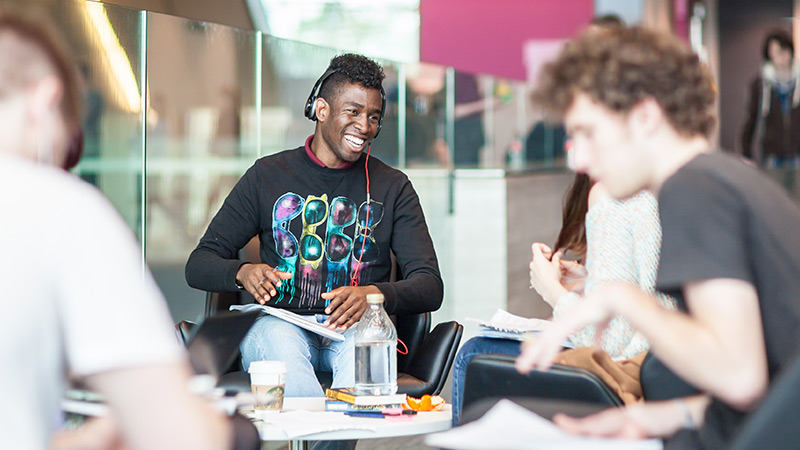Modern Languages with Translation (with Foundation Year)
BA (Hons)
Find out more by joining our live webinar and course information session
UCAS code: Q15F
Start dates: September 2026
Full time: 4 Years, or 5 if a work placement is chosen
Part time: Up to 11 years
Location: Headington
Overview
Languages open doors to global careers, and our Modern Languages with Translation degree is designed for all learners, whether you’re starting from scratch or building on existing skills.
The foundation year gives you the academic skills needed for degree-level study while exploring big questions in humanities, such as global identities and cultural influences. You’ll develop research and communication skills before progressing to your language studies.
In the degree, beginners can achieve fluency in French, Japanese, or Spanish, while intermediate learners can advance to C1 level in French, or Spanish. Alongside language proficiency, you'll gain translation expertise and explore cultural perspectives valued by employers worldwide.
With options to study abroad or complete your degree in three years, this course offers flexibility, academic depth, and real-world application, preparing you for an international career.

Why Oxford Brookes University?
-
Learn a modern language from scratch
You can start our programme with no previous knowledge and work up to being fluent. Or you can advance your language skills if you join us at intermediate level.
-
Gain the knowledge to live like a local
You’ll understand the culture, the humour and feel confident to live, work and study across the world.
-
Stand out from the crowd
Compete in the competitive international market with your exceptional language skills.
-
Perfect preparation
Build essential study skills with an integrated foundation year. Gain academic confidence, improve critical thinking, and strengthen subject knowledge for your degree journey.
-
Supportive environment
We’re a tight-knit language department and we’ll get to know you as an individual. Tutors are on hand to support all aspects of your development, from academic research to career preparation.
-
Study abroad
You may be able to go on a European or international study exchange while you are at Brookes. Most exchanges take place in the second year. Although we will help as much as we can with your plans, ultimately you are responsible for organising and funding this study abroad.
Course details
Study modules
Teaching for this course takes place face to face and you can expect around 9 hours of contact time per week. In addition to this, you should also anticipate a workload of 1,200 hours per year. Teaching usually takes place Monday to Friday, between 9.00am and 6.00pm.
Contact hours involve activities such as lectures, seminars, practicals, assessments, and academic advising sessions. These hours differ by year of study and typically increase significantly during placements or other types of work-based learning.
Please note: As our courses are reviewed regularly as part of our quality assurance framework, the modules you can choose from may vary from those shown here. The structure of the course may also mean some modules are not available to you.
Careers
You’ll graduate with a unique combination of skills that are prized by international employers.
You’ll have highly developed language skills - and you’ll competently speak two languages or more. Your advanced intercultural awareness will equip you for any transnational workplace. You’ll have a professional specialism relevant to major international careers. And you’ll have credible work experience on your CV.
Graduates from our language programmes have progressed into fields such as:
- media and journalism
- tourism and travel
- publishing
- NGOs and international development
- governmental and diplomatic posts
- teaching
- banking and insurance.
Entry requirements
Wherever possible we make our conditional offers using the UCAS Tariff. The combination of A-level grades listed here would be just one way of achieving the UCAS Tariff points for this course.
Standard offer
UCAS Tariff Points: 48
A Level: DD
IB Points: 24
BTEC: PPP or MP
Specific entry requirements
You can study the beginners route with no previous language study, but our intermediate programme requires an A level in French, Spanish or English as a Foreign Language.
Applications are also welcomed for consideration from applicants with European qualifications, international qualifications or recognised foundation courses. For advice on eligibility please contact Admissions: admissions@brookes.ac.uk
Please also see the University's general entry requirements.
English language requirements
Please see the University's standard English language requirements.
Credit transfer
Many of our courses consider applications for entry part-way through the course for students who have credit from previous learning or relevant professional experience.
Find out more about transferring to Brookes. If you'd like to talk through your options, please contact our Admissions team.
Terms and conditions of enrolment
When you accept our offer, you agree to the Terms and Conditions of Enrolment. You should therefore read those conditions before accepting the offer.
How to apply
Application process
Full time international applicants can also apply through UCAS
Tuition fees
Questions about fees?
Contact Student Finance on:
Tuition fees
Please note, tuition fees for Home students may increase in subsequent years both for new and continuing students in line with an inflationary amount determined by government. Oxford Brookes University intends to maintain its fees for new and returning Home students at the maximum permitted level.
For further information please see our tuition fees FAQs.
Tuition fees for International students may increase in subsequent years both for new and continuing students.
The following factors will be taken into account by the University when it is setting the annual fees: inflationary measures such as the retail price indices, projected increases in University costs, changes in the level of funding received from Government sources, admissions statistics and access considerations including the availability of student support.
How and when to pay
Tuition fee instalments for the semester are due by the Monday of week 1 of each semester. Students are not liable for full fees for that semester if they leave before week 4. If the leaving date is after week 4, full fees for the semester are payable.
- For information on payment methods please see our Make a Payment page.
- For information about refunds please visit our Refund policy page
Additional costs
Please be aware that some courses will involve some additional costs that are not covered by your fees. Specific additional costs for this course are detailed below.
Optional costs
| Additional costs | Amount (£) |
|---|---|
It’s your responsibility to cover print / binding costs where coursework submission is required. Please note that a lot of the coursework is now submitted online. |
From £30 |
| You may choose to purchase books to support your studies. Many books on our reading lists are available via the Library, or can be purchased secondhand. | £20-60 per book |
Accommodation fees in Brookes Letting (most do not include bills) |
£107-301 per week |
Accommodation fees in university halls (bills included, excluding laundry costs) |
£139-248 per week |
Graduation costs include tickets, gowning and photography. Gowns are not compulsory but typically students do hire robes, starting at £41. |
Typically £0-200 |
Students are responsible for their own travel to and from university for classes. For the 2025/26 academic year, the University is introducing an alternative subsidised travel offer for all students with further information on our Travel webpages. |
From £10 |
Funding your studies
Financial support and scholarships
Featured funding opportunities available for this course.
All financial support and scholarships
Information from Discover Uni
Full-time study
Part-time study
Programme changes:
On rare occasions we may need to make changes to our course programmes after they have been
published on the website. For more information, please visit our
changes to programmes page.

